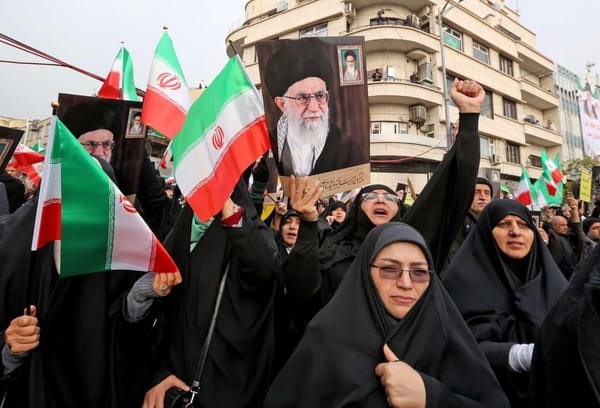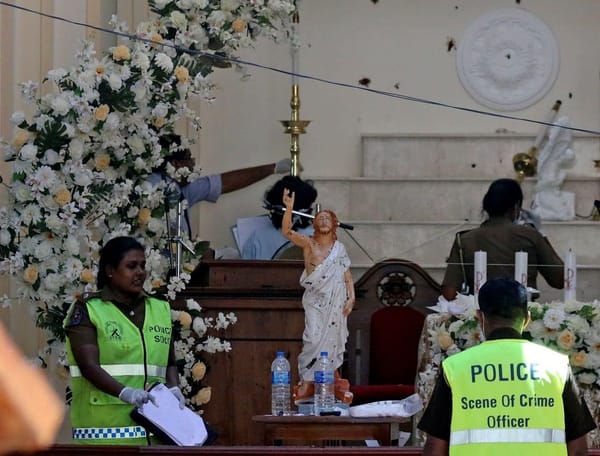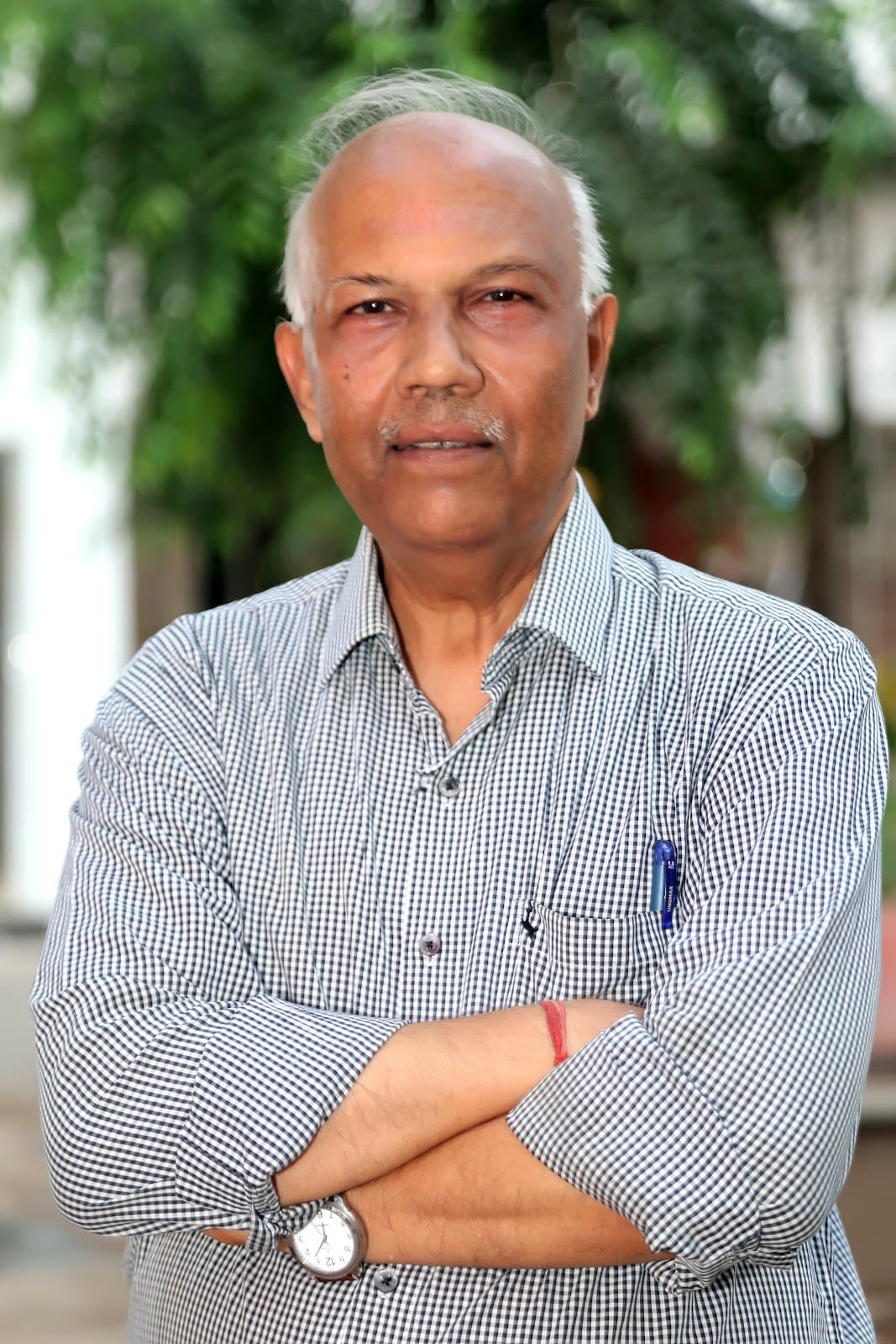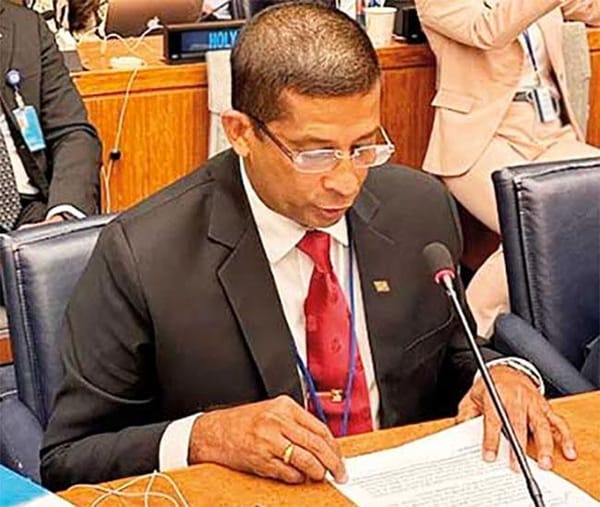Translated from the original Tamil short story கடைசிக் கைங்கரியம் from the 1964 collection of short stories titled அக்கா
By : A. Muttulingam
Translated by: Eḻuttukkiṉiyavaṉ
Cry, Thaṇigāsalam, cry. Don’t stand silently like a tree. Your own wife, that saint who bent her head to receive your thāli in a promise to share in your joys and sorrows till death do you part, now lies here as a corpse.
But you stand there staring at a distance. Is your heart made of stone! Or have you petrified into a statue?
But you stand there staring at a distance.
Is your heart made of stone!
Or have you petrified into a statue?
you human worm, cry; you ought to cry.
Tears, flood forth! Stream out of his deadened eyes!
He must indeed cry.
Thaṇigāsalam sits leaning against the eastern pillar, like a piece of dead wood. His left hand bent to support his chin. With eyes reddened like kōvaippaḻam, and hair disheveled, he looks spent.
Who wouldn’t? Who could sit up with pride after having lost one’s wife?
There on the bed, they have laid out Kamalā, nay the corpse, like a bag of skin and bones.
A clean white sheet is draped over her. Sandalwood paste in her eyes! Dried thirunīṟu on her forehead; vermillion on top of it; they have taken care to do all the ritual decorations worthy of a high-status corpse without leaving anything amiss.
Someone had even tied her feet together with a jute rope. Criminals!
A lamp by the headboard of her bed flickers as though it would go out at any instant, illustrating the impermanence of life.
She is unaware of all these ‘festivities.’ She is a corpse!
''annai where is the room key?''
Thaṇigāsalam raised his unkempt head to lift his gaze up to the top of the opposing pillar.
The key was safely ensconced there.
“di… Kamalā! When you left that key there, did you realize that you would never pick it up again?
What patient imagines death? Everyone believes that they will get better.”
Sāmpasivam stopped by.
“What is this Thaṇigāsalam, you sit here crestfallen? This isn’t a sudden shock, is it? She has been bedridden for days…”
“What can we do? When we took her to hospital, she appeared to be stable… mmm… this is the nature of tuberculosis.”
Who said tuberculosis is the cause of death? Who would know the real reason why she died?
He looked at Kamalā; he looked at the humongous satinwood box that lay next to her with its mouth gaping open. It was silently inviting her, “Come, come.”
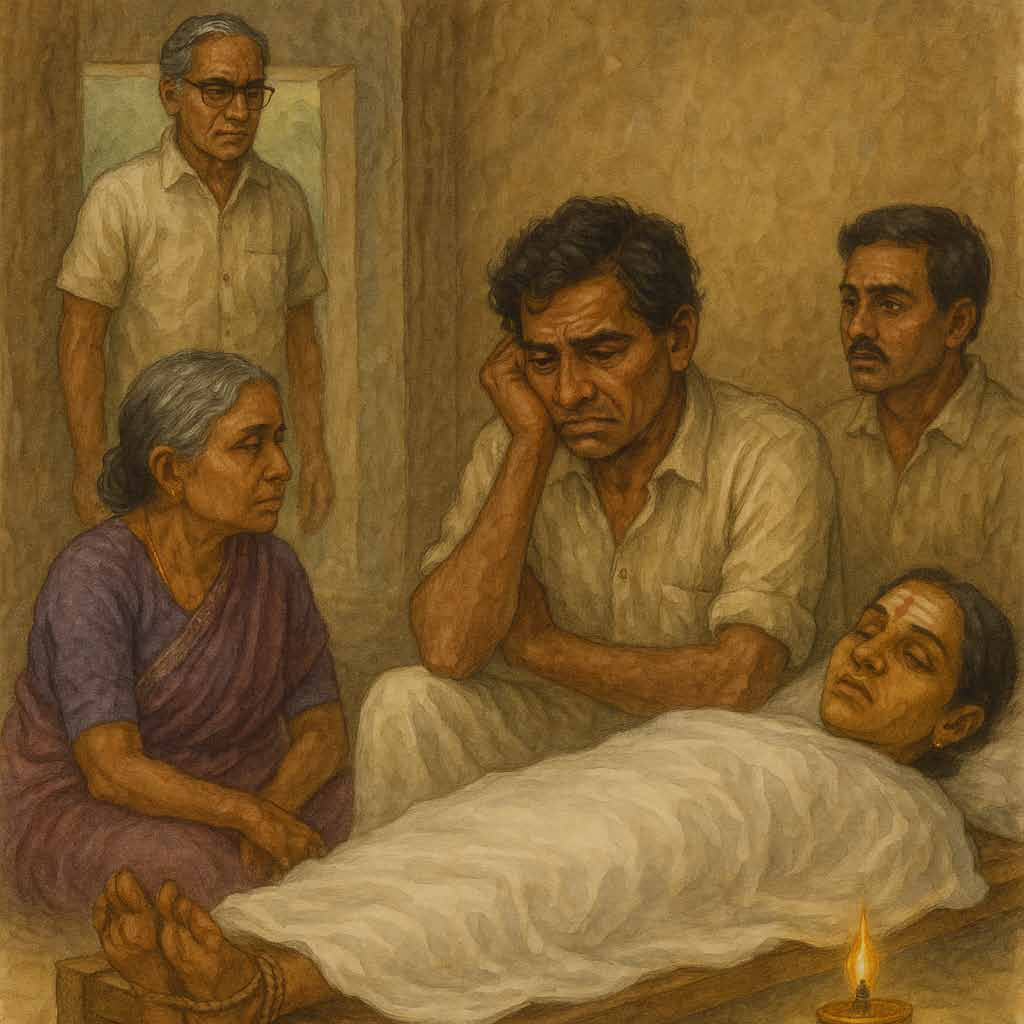
Her cracked lips. Once they were red like kōvaippaḻam. A housefly flew in from somewhere and perched itself on her lower lip. A second one followed suit. Her slender fingers did not attempt to gently shoo them away as usual. Nor did her eyes well up, saying, “would you come here and fan me? Why do you not pay attention to me now?” She remained dead. How illness changed her!
Earlier, he couldn’t even go near her. He could never tell when her temper would flare up.
“Kill me, I will die,” she would scream.
Perhaps all that screaming probably led to half of her life energy storming out of her body. Why was she plagued with doubt, why was she quick to anger, even as she was emaciated, and her body was without strength? From brushing her teeth at dawn, till giving her medicines at bedtime and gently massaging her legs, he took care of her. His respite was only when he was at work. Nevertheless, she could not stand the sight of him.
Why? Why?
That day, Thaṇigāsalam was buried in never-ending work at the office. Not just that day, but for a month, the new manager at work cursed the old manager, and turned all the old files upside down in the name of streamlining.
Until his lady Muriel intervened to say, “darling it’s too late,” he would not leave the office. How would he know about Thaṇigāsalam’s darling wife and the rare illness that plagued her?
When Thaṇigāsalam stepped into the house, his wife was the devil incarnation herself.
“Why so late?”
They were ordinary words. But the tone in which she uttered them was enough to shake heaven, earth, and the netherworld!
Thaṇigāsalam felt as if someone had slammed his heart with an iron rod.
“You don’t have to tell me anything. I know. The whole town’s laughing at your dalliances. I am indeed on my way to death… you and that Mary…”
“Kamalā!” “Why are you shushing me… I will ask… that is exactly how I will ask.” She screamed like the devil.
Thaṇigāsalam did know what he would do if he succumbed to his anger. But he restrained himself. He touched her shoulder gently and tried his best to console her saying:
“Kamalā, don’t shout! This screaming has devastated your body. How many times did the doctor tell you so? Lie down, my darling Kamalā.”
But her suspicion was never quelled. She was convinced that Thaṇigāsalam had betrayed her and was now trying to pull the wool over her eyes.Was she wrong to suspect him? She certainly had a shrewd understanding of the male psyche.
adi Kamalā, you were not wrong at all. You were completely right. I betrayed you. I betrayed you wholesale!
The paṟai drum thundered “dum dum dum”. He felt as though someone was pounding his heart with a sledgehammer. He wanted to drag those paṟai drummers out by their collars. He could not come to terms with the fact that his house is now a funeral house.
Did Kamalā really die? Will she never open her eyes again?
What if there was a sudden miracle and she could raise herself up again?
“Indeed māmi, for how long could the husband suffer? He was torn between taking care of his job and the household… at least her passing will relieve him of this stress…”
“Still, she had good karma. Not everyone is fortunate enough to die wearing a thāli.”
“Was it just a month or two? A whole year – who knows what hardships she had to endure.”
“Did you not know?” (in a hushed voice) “It seems their horoscopes did not match at all.”
“That is the bane of love marriages…”
Thaṇigāsalam felt the anger surge within him. He wanted to tear that dirty mouth to pieces. Thaṇigāsalam was startled when a lone voice started to lament:
“Did you leave me, my precious queen?”
It was Rāsam from the house across the street.
If only Kamalā were alive now…
He had taken the day off that day. Thaṇigāsalam was at home. Kamalā’s health had improved somewhat. He had given her the morning medicines, put her to bed in the living room, and was pacing in the outer veranda. Suddenly his instincts telegraphed him. He turned abruptly and was shaken by what he saw. She stood holding on to the window bars, her hair undone, looking like terror personified.
“Why are you grinning at her?” she demanded angrily.
He turned back around. Only then did he notice. In the veranda of the house across the street, Rāsam sat combing her wet hair, oblivious to her surroundings. She refused to believe Thaṇigāsalam despite his earnest and heartfelt proclamations of innocence.
Within a month of her becoming bedridden, she drove away the woman who was the household help. Calling her a “woman” borders on hyperbole. She was a withered old grandmother.
“Kamalā, how did the devil of doubt enter your heart? Do I look like a scoundrel? Do I look so degenerate?”
You did not make a mistake, Kamalā. You were completely right. I am a sinner! A sinner unworthy of forgiveness!
“I realized it today. You realized it long ago. You are smart, very smart.”
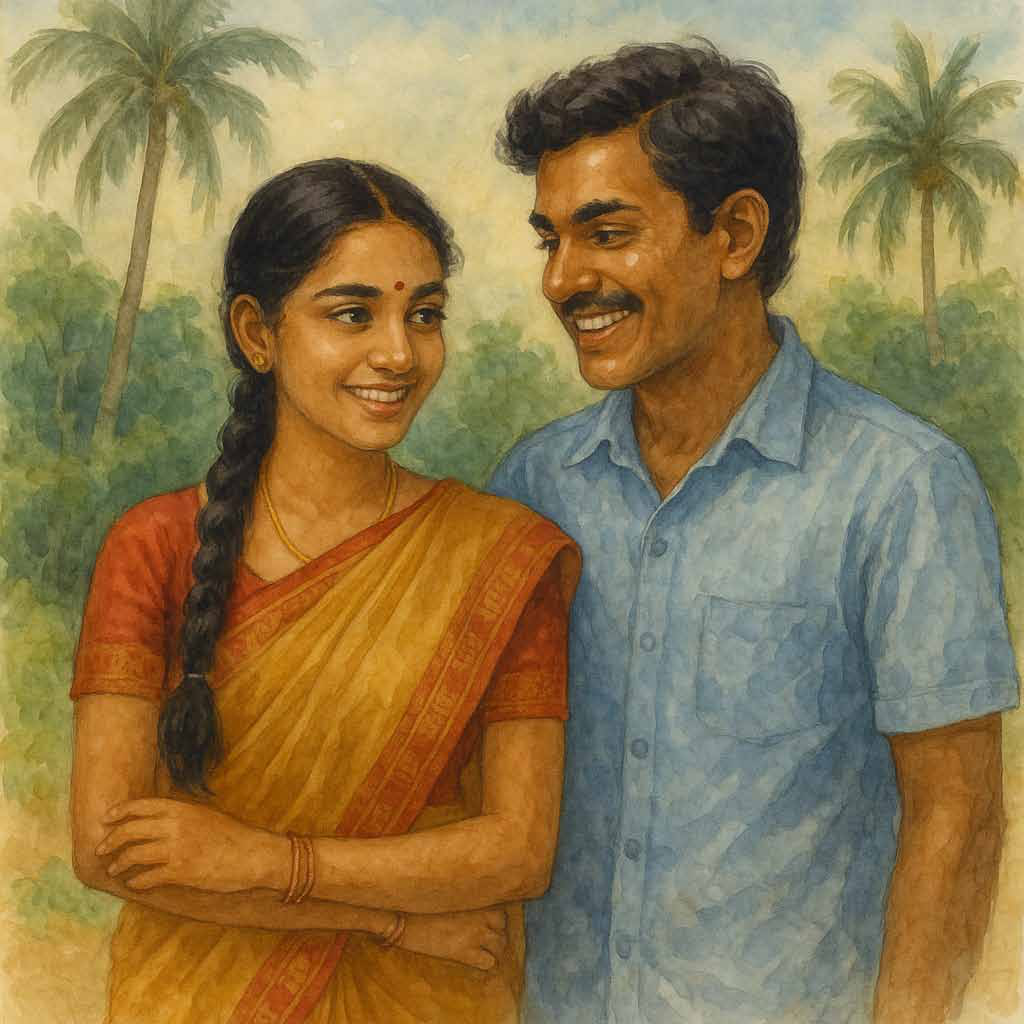
The funeral bustle got going. The menfolk spread out a piece of cloth under the tamarind tree and started playing cards. Those who knew how to play, or those who didn’t, circled around and offered free advice. Some of the older folks secreted a couple of cigars for later use and started complaining, “What an awful cigar is this? If one were to smoke, one must smoke the VK cigars… how bitter.” Others sneaked around to the side yard and returned smacking their lips, unsteady as their feet refused to move.
On the women’s side, the tray with betel leaves and old gossip kept their jaws in perpetual motion. A stunning funerary palanquin was taking shape by the main entrance. Māṇikkam, the dead woman’s father, was supervising the preparations. What other opportunity would he get to dazzle the village?
The funeral lamentation was reaching a crescendo. Ensemble and solo performances alternated. Some women weaved petty village squabbles into their lament songs. Others summoned tears by recalling their own dear departed. Those constitutionally unable to cry simply recited the lament with fluency. No one paid any attention to Thaṇigāsalam. He was the only one who truly appreciated the loss of his wife.
When Kamalā was admitted to the hospital, he feared how he would cope. But the events in the hospital unfolded unexpectedly: she stopped snapping at him and grew silent, as if in a deep trance. When the nurses stopped by her bed, he made himself scarce—he was afraid she might say something inopportune. Yet she observed a fierce silence.
“Kamalā… adi Kamalā… why did you change that rare trait of yours? Did you suddenly develop total trust in me?”
“When the new nurse showed up for night duty, Thaṇigāsalam felt a pang. She smiled needlessly.
‘Put this vial in your pocket. I will fetch the syringe and cotton wool.’”
“Whatever she said, her gay laughter, like the needle in her hand, killed him.”
“Sister, what do you say, will she survive?”
He stood there looking piteously as if his tears would breach their dam. He yearned to be hugged and consoled like a baby.
“You are a man. If you are shaken even for this… when I see you, my heart is shaken, too… Look here—”
As she spoke, her hands clasped his.
He first saw that dome lamp at a great distance, covered so that the bright light didn’t blind one. His sixth sense must have alerted him. He bolted without looking back, but his heart kept pounding. What he feared had come to pass: she lay in an untidy heap. Half in bed, and half outside, she hung there helplessly. Her slender long hands lay abandoned.
“Does he have the right to conduct her funeral rites?”
One or two people, keen to send Kamalā to the cemetery on time, assisted the Hindu priest.
“Where is Thaṇigāsalam?”
“eda , Thaṇigāsalam, pour a couple of buckets of water over your head and come; the priest is waiting.”
Perhaps at least the outer appearance ought to be holy. He stood rooted to the spot.
“Get up, thampi, the corpse is going to stink.”
Thaṇigāsalam felt like knocking his teeth off. “Corpse? Stink?” He felt like sobbing.
“Remove your shirt, Thaṇigāsalam.”
He shifted a little and removed his shirt in disgust. Something fell at his feet and shattered. It was the medicine vial the nurse had given him—the famous German medicine that had the power to arrest a departing soul.
He became petrified again.





